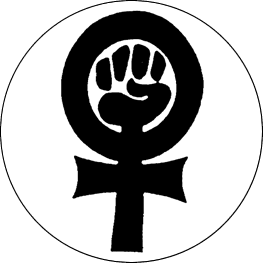 |
||||
|
Ecofeminism and Equality
By Scott Johnson "Equality is valuable only when it encourages rather than destroys differences" - Michael Levin There is a place I used to go. Fragrant flowers bloomed brilliantly among tall grasses and ferns in a meadow guarded by huge cedars, pines, and fir. Large gangling madrones and dogwood grew near the edge of a bubbling spring and I would go there to experience the unison of life in its inspiring display of natural rhythm. Now, there is only gray dirt piled in ragged burms against bare splintered stumps and eroded debris. Empty diesel cans, rusty choker cables, and black smoldering slash piles decorate the once living hillside. I look away and wonder who is responsible for this. Who are the perpetrators and where are the guardians? When you see an injustice, do you feel you have options? Environmentalists think so and so do feminists. There seems to be an alignment between the goals of both. Both seek to right the wrongs of injustice. The connection between how men and women interact and the way they interact with the environment may be implicit. After all isnít the human sphere the natural sphere? In the politically correct world, everybodyís a feminist - or not. In the spirit of the '90s there seems to be a flavor for everyone. There is socialist, radical, or liberal feminism, power feminism, womanists, lesbians, separatists, National Organization for Women, to name a few. Maybe something from the backlash movements like, the Total Woman Movement, Mythopoetics, Freemen, or the National Organization for Men Against Sexism would fit your agenda better. There is another very interesting movement called Eco-feminism. What does feminism have to do with the environment? Survival of our species may depend on greater understanding between men and women. Eco-feminists seek a more balanced relationship between humankind and the Earth. Is it time for some further change or do we look temporarily in amazement then return to what we were doing without much thought? Eco-feminism looks at attitudes and worldviews that differ based on male and female perceptions of life. Whether gender difference is biological or social is in hot debate. But it seems our most effective influence will be in the social sphere. Our ability to homogenize those perspectives may result in better environmental policies. To shut out the voice of either men or women seems unproductive. Maximizing the strongpoints of each may prove more beneficial. Acknowledging the sexual power of both women and men and how they fit together instead of how they differ may be more productive. It seems reasonable that working toward a more inclusive interaction is the key to the longevity of our species. "Men and women shed light on different things," said Caitlin Allion, who chairs the Environmental Affairs Council at California State University Chico. "Men can be strong in pushing the movement forward." Caitlin, through example, and a spirit of inclusion, shows her strong commitment to helping the environment and a willingness to work with others toward that goal. Allion and the EAC have done much to raise awareness about recycling on campus and to educate themselves and students about managing environmental problems. This is her way of making a difference and using her voice to create positive change.
It is participation and cohesiveness between individuals that Allion seeks, and that is what is needed for progress toward common environmental goals. For 10 years the EAC has had the goal of ridding the campus of styro-foam and "itís about time to finish it," Allion said. The EAC has a list of many goals but they try to focus on 10 solid, realistic objectives. The amount of information that comes her way is sometimes overwhelming but she likes to "organize and make time." " I really like it when other individuals have ideas and I can help them reach their goals," said Allion. We all use environmental resources to survive. Opportunistic behaviors are at the core of human genetic survival in a harsh existence. While these behaviors sometimes help to enable survival, they can also be environmentally destructive. Manís willingness to exploit the environment without reciprocity must be reevaluated. Travelling in any direction from Chico it is easy to find visible examples of this destruction. Clear-cuts leave deep scars of erosion where exposed rock and buck-brush represent what used to be lush and diverse forest. Hydroelectric plants suck the life from rivers now silted with topsoil from the surrounding mountains. The blue sky is brown with unbreathable rice smoke. And whole mountains are washed away in search of gold and gravel. It is also true that the nurturing behavior of women is essential to enabling survival. Perhaps learning to place more value on the strengths and differences of both sexes will result in greater regard and balance within the environment. It seems possible our intellectual tenacity and desire could try to surpass our social and biological predisposition. One group that seeks a greater cooperative balance in the human environment of the CSUC campus is the Feminist Majority Leadership Alliance. Headed by Melissa Knight, one of the organizationís goals is to create a more cohesive atmosphere of communication among the different groups on campus. Raising awareness about the goals of each group and finding common ground will give continuity and strength to those relationships. On October 5, 1999, the FMLA sponsored a potluck in the multi-cultural center for campus diversity groups to come together and begin dialogue establishing some positive foundational relations among them. "Our mission is first to educate ourselves on feminist issues and gain leadership and organizing skills," Knight said. "Second, our mission is to use that knowledge to take action and make change in our community, statewide, nationwide and/or internationally. We are also concerned with the issues other progressive groups are focusing on, after all we're all really fighting for the same thing: justice."Cooperative efforts are essential whether the goal is environmental or focused on human rights. Cooperation between students, citizens, and the groups they represent requires solid communication and a commitment to the goals, but participation is the key. "The potluck went well. There weren't as many people as I had hoped. Mostly it was people from the FMLA and the EAC, so it was a good chance for our two groups to get acquainted. Hopefully we can get a more diverse crowd next time," Knight said. The FMLA sponsored a panel discussion on October 28, 1999 involving interested students and professors from CSUC. The subject was "gender communication in university life" with the intent of raising awareness about the related issues concerning the dynamics of gender. Gender definitions are at the core of differing male and female perspectives. Those perspectives are reflected in a concrete way as well as symbolically. If we look at differing treatment of environmental issues this is evident. Thorough examination of gender constructions can result in better understanding about men and women, and our treatment of the environment. One issue that came up during the panel was a prevailing silence not just from men but from some women who may not simply be less outspoken but may be ambivalent about expressing/exposing themselves to some more radical feminist thinking as well as male prevalent thinking. Silence can indicate fear, lack of breadth, or simply that learning is taking place. Certainly much learning takes place through both listening and dialogue. Considering issues of gender and preservation of the environment, dialogue and a willingness to listen will be essential to successful interactions.
"I believe there is a definite connection between women and nature, as well as between men and nature. Ideas concerning ecofeminism and what it means are divergent among feminists. Personally, I think that there needs to be more of a focus on men's relationship with nature since this has already been established in women. "Since biblical times, men have been viewed as having Ďdomainí over the Earth. This mentality has led not only to the devastation of the environment, but also many of the other óisms (i.e. sexism, racism) associated with white Christian patriarchy. When communities were more focused on survival, women were more valued and respected, as was the environment. "When the notion of private property was introduced, women as well as land were considered property of men. Many women believe strongly that women naturally have a stronger relationship with nature than men," Knight said. In general, it happens that women are naturally geared to view the world in terms of relationships and communication for their continuity and design. (Integrity weighs a lot here.) The nurturing of relationships is seen as a beneficial cooperative mechanism. Developing lines of communication and nurturing a better understanding about what will strengthen our possibilities for survival seems important. Many men also feel they have a strong relationship with the environment based on a dynamic of preservation and care. But it is the prevailing overall dynamic of corporate exploitation that is so objectionable and canít be ignored. It becomes increasingly clear that collective challenge is necessary based on the unity of both men and women. Again, dialogue between us is most essential. In any exercise of group thinking the greatest productivity comes from assigning tasks to individuals based on their particular strengths. This makes good sense. It seems reasonable then, in terms of our relationship to the environment to maximize the strengths of the female nature along with men in a dynamic interaction. Our interdependence with Earth systems is undeniable as is the yin and yang of the different human sexual natures. "I doubt most humans would be willing to abandon the advantages of technological control over nature, but sometimes we need to be made aware of the larger picture and long-term consequences; that we have our limitations and must ultimately accept our role as a small part of the whole," said philosophy professor Robert Stewart. Eco-feminists see a correlation between the general status of women in society and the exploitation of the environment. This dominance man has assumed over the Earth is reflected in the relational dialectic between men and women. How men generally act when they are angry is a good example of that dominance. For many, Mother Earth is viewed as being symbolically female in nature because of her life giving qualities and should not be viewed as an object. Rather her bounty should be viewed with a spirit of reverence and reciprocation. It seems reasonable that most women want to be thought of with the same regard. Possibly a clearer understanding and value for the relationship humankind has with nature is a good priority. Looking at the Earth, as an object, merely as a means to be exploited is proving destructive in terms of the present and the future. If we remove the trees, suck the life from the soil, silt the oceans, clog the organs of respiration, drain the blood and deny the consequences, we may be turned under her surface without ever knowing the depth of our time here.
|
|
|||
|
|
||||

Many traditions like the Hopi have continued for thousands of years because of a more balanced worldview, one that is less exploitative. Their view is more inclusive and reverent of the female nature and its power. Those that have burned out like the Aztecs and Ancient Egyptians simply ran out of resources. Eco-feminism is a movement kin to a humanism that wants us to see the world and its inhabitance including its resources, in a more complete historical context. Social evolution fits into the Gaia of a whole interdependent system. Historically this is nothing new and the (primarily male) disposition of exploiting the environment did not extend so deeply until a firm grip on mechanistic science took hold. One theory that correlates with Knightís expressions is presented in a book by Dr. Helen Fischer and says that, before the advent of mechanized agriculture which required brute strength and provided for more children there was more dependence on women to provide valuable resources. There existed a greater balance of power. The life giving qualities of women were valued more implicitly rather than as another resource. Men began to monopolize power by exploiting labor and resources. The relationship between men and women shifted from one of interdependence to one of dependence. The life giving qualities of women were still valued but men controlled the resources. Men still control the resources-- and most environmental issues now extend to the worldwide. Surely mans exploitative nature was compounded by a turning of events. But those events have brought destruction and have corrupted the environment and humanity to critical levels. Mechanism and the male dominated sciences have excluded the female nature from its presence in the grand scheme, creating a major imbalance in our relationship to the Earth/universe. It seems men must be willing to hear what is sometimes hard to hear and be willing to move forward from there.
Saving the Earthís environment from destruction is thought of as the common ground men and women need to survive as a species if that is possible. There needs to be some "reciprocity" between men and women and between humans and nature. Hmmm. That men and women are wired differently (socially and biologically) doesnít seem to be much in question. We look at the world in different ways. We have different expectations and desires but we all want to live. Intellect may have the capacity to free us from the chains of social conditioning and to moderate biological predisposition. Our minds can tell us to move forward and to be aware, increasing our ability to understand our human as well as our physical environment. It is a dynamic relationship we have with the environment and with each other. Allion might agree that participating in the dialogue and becoming involved is a conscious effort worth pursuing. Attitudes surrounding domination and exploitation are key in the argument between women and men as they are in issues concerning the earth and her resources. Some would argue there is a separate trajectory for the earth and for humanity. Butthe earth and all her elements that provide the womb, nurture, and life that sustain us. Our paths are tied and we canít exactly cut the cord. Restoring the balance in a world out of whack is good common ground with mutually beneficial results. Recognizing and respecting diversity with a spirit of inclusion is fundamental to success. Nature is the breast for humankind and reciprocity to the system is essential. She is seemingly boundless, but it has become clear that is not true. It will take the unity and strengths of both sexes to return to some balance and solve the problems necessary for our survival. These days, there are as many kinds of feminism and backlash movements as there are kinds of aspirin on the shelf at the supermarket. While many have their fine points it is hard to fathom where exactly to take a stand or whether to take one at all. Many people simply look away and attend to their busy lives. The problem is that we are all part of the social structure that supports the bias of gender presumptions; that many of society's incorporated values are fallacious, have been outlived and an imbalance exists. Doctors are looking more and more at the idea that many physical ailments are the result of some imbalance within the body system. If we look at the planet, its resources and living organisms as an interdependent body system then it seems rational to seek balance of the system. Not all men are exploitative and aggressive beyond reason. Not all women fit their proscribed construction either. It is the collective presumption that supports the way things are and we must collectively begin to change the destructive elements. New-feminism wants balance, cooperation and forward movement. The dialogue is there and participation is the only requirement. It is not the label you take but the things you do. Use your voice.
|
||||
 |
|
 |
||

 Allion said one of the biggest obstacles to the goals of the EAC is "getting student and citizen participation at the meetings and events." Allion wishes she "could talk one on one with each individual who has some tiny hint of interest and tell them that it takes that same energy of interest to become active and to understand what we are trying to bring to the people."
Allion said one of the biggest obstacles to the goals of the EAC is "getting student and citizen participation at the meetings and events." Allion wishes she "could talk one on one with each individual who has some tiny hint of interest and tell them that it takes that same energy of interest to become active and to understand what we are trying to bring to the people."
 When asked about the connection men and women have to the environment, Knight said she feels there should be more focus on menís relationship with nature.
When asked about the connection men and women have to the environment, Knight said she feels there should be more focus on menís relationship with nature.
